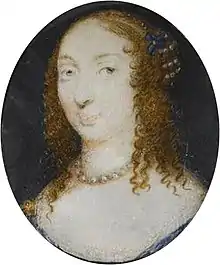

Dame d'atour was an office at the royal court of France. It existed in nearly all French courts from the 16th-century onward. The dame d'honneur was selected from the members of the highest French nobility. They were ranked between the Première dame d'honneur and the Dame du Palais.
History
At least from the Isabeau of Bavaria's tenure as queen, there had been a post named demoiselle d'atour or femme d'atour, but this had originally been the title of the queen's chambermaids and divided among several people.[1]
The office of dame d'atour, created in 1534, was one of the highest-ranking offices among the ladies-in-waiting of the queen and given only to members of the nobility.[2]
The dame d'atour had the responsibility of the queen's wardrobe and jewelry and supervised the dressing of the queen and the chamber staff of femme du chambre.[2]
When the dame d'honneur was absent, she was replaced by the dame d'atour as the supervisor of the female personnel of the queen.[2]
List of dames d'atour to the queens and empresses of France
Catherine de' Medici, 1547–1589
- 1547–1549 : Marie-Catherine Gondi[3]
- 1549–1552 : Jacqueline de l'Hospital Dame d'Aisnay [4]
- 1552–1559 : Madeleine Buonaiuti, Madame Alamanni, Mme de Gondi [5][6]
Élisabeth d'Autriche
- 1570–1574: Marguerite de La Marck-Arenberg
Louise of Lorraine, 1575–1601
- 1575–1590: Louise de la Béraudière
Marie de' Medici, 1600–1632
- 1600–1617: Leonora Dori[7]
- 1617–1619: Vacant
- 1619–1625: Nicole du Plessis de Mailly, marquise de Brezé
- 1625–1631: Duchesse d'Aiguillon
Anne of Austria, 1615–1666
- 1615–1619: Luisa de Osorio (jointly with de Vernet)
- 1615–1626: Antoinette d'Albert de Luynes, Dame de Vernet (jointly with de Osorio)
- 1626–1626: Marie-Catherine de Senecey
- 1626–1630: Madeleine du Fargis
- 1630–1657: Catherine le Voyer de Lignerolles, Baronne du Bellay, Dame de la Flotte
- 1637–1639: Marie de Hautefort, 'Madame de Hautefort' (deputy dame d'atour, first term)
- 1643–1644: Marie de Hautefort, duchesse de Schomberg (second term as deputy)
- 1657–1666: Louise Boyer, duchesse de Noailles
Maria Theresa of Spain, 1660–1683
Marie Leszczyńska, 1725–1768
- 1725–1731: Anne-Marie-Francoise de Sainte-Hermine, comtesse de Mailly
- 1731–1742: Francoise de Mailly, duchesse de Mazarin
- 1742–1768: Amable-Gabrielle de Noailles, duchesse de Villars
Marie Antoinette, 1770–1791
- 1770–1771: Amable-Gabrielle de Villars
- 1771–1775: Adelaide-Diane-Hortense Mancini-Mazarin, duchesse de Cossé
- 1775–1775: Laure-Auguste de Fitz-James, Princess de Chimay
- 1775–1781: Marie-Jeanne de Talleyrand-Périgord, duchesse de Mailly
- 1781–1791: Geneviève de Gramont, comtesse d'Ossun
Joséphine de Beauharnais, 1804–1809
- 1804–1809: Émilie de Beauharnais
Marie Louise, 1810–1814
- 1810–1814: Jeanne Charlotte du Luçay
See also
- First Lady of the Bedchamber, British equivalent
- Maid of the Bedchamber
References
- ↑ Caroline zum Kolk, "The Household of the Queen of France in the Sixteenth Century", in: The Court Historian; vol. 14, number 1, June 2009
- 1 2 3 Nadine Akkerman & Birgit Houben, eds. The Politics of Female Households: Ladies-in-waiting across Early Modern Europe Leiden: Brill, 2013
- ↑ Bonte, Pierre; Gené, Enric Porqueres I.; Wilgaux, Jérôme (4 July 2014). L'Argument de la filiation: Aux fondements des sociétés européennes et méditerranéennes. ISBN 9782735116836.
- ↑ "Les membres des maisons royales de la cour de France - Résultat de recherche".
- ↑ Catherine de Médicis
- ↑ Milstein, Joanna (9 March 2016). The Gondi: Family Strategy and Survival in Early Modern France. ISBN 9781317030010.
- ↑ Marie de Medicis and the French court in the XVIIth century
- Mathieu da Vinha & Raphaël Masson: Versailles: Histoire, Dictionnaire et Anthologie
- Anselme de Sainte-Marie & Ange de Sainte-Rosalie: Histoire généalogique et chronologique de la Maison Royale de France